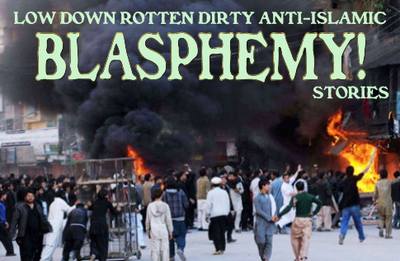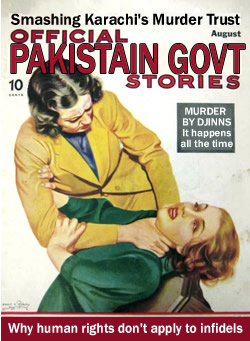 [DAWN] The horrifying case of the killing and burning of a young Christian couple, Shama and Sajjad, by a mob in a village in Kasur could become a test case for the government to demonstrate -- for once -- its commitment to the rule of law in incidents where the vulnerable are attacked. [DAWN] The horrifying case of the killing and burning of a young Christian couple, Shama and Sajjad, by a mob in a village in Kasur could become a test case for the government to demonstrate -- for once -- its commitment to the rule of law in incidents where the vulnerable are attacked.
It won't.
For the first time, the state has become a petitioner in the case and appointed a minister, Kamran Michael, to be the focal person on the case.
In Pakistain there's no difference between civil and criminal law. If there's no "first information report" filed then the crime didn't happen. If the FIR is withdrawn then the crime unhappens.
However,
those who apply themselves too closely to little things often become incapable of great things...
we cannot hold our breath expecting justice to be miraculously delivered. Going by past instances, it is members of minority communities who are persecuted -- and prosecuted -- while perpetrators are set free. The administration and the judiciary are responsible for this unjust state of affairs.
Meanwhile,
...back at the argument, Jane reached into her purse for her .38...
the family of Shama has already rejected the government's decision and has decided to be plaintiffs themselves, demonstrating a lack of trust in the government.
The greatest challenge in the current situation is one of impunity. Since the addition of Sections B and C to PPC 295 (commonly known as blasphemy laws) by the government of Gen Zia ul Haq
 ...the creepy-looking former dictator of Pakistain. Zia was an Islamic nutball who imposed his nutballery on the rest of the country with the enthusiastic assistance of the nation's religious parties, which are populated by other nutballs. He was appointed Chief of Army Staff in 1976 by Prime Minister Zulfikar Ali Bhutto, whom he hanged when he seized power. His time in office was a period of repression, with hundreds of thousands of political rivals, minorities, and journalists executed or tortured, including senior general officers convicted in coup-d'état plots, who would normally be above the law. As part of his alliance with the religious parties, his government helped run the war against the Soviets in Afghanistan, providing safe havens, American equipiment, Saudi money, and Pak handlers to selected mujaheddin. Zia died along with several of his top generals and admirals and the then United States Ambassador to Pakistain Arnold Lewis Raphel when he was assassinated in a suspicious air crash near Bahawalpur in 1988... ...the creepy-looking former dictator of Pakistain. Zia was an Islamic nutball who imposed his nutballery on the rest of the country with the enthusiastic assistance of the nation's religious parties, which are populated by other nutballs. He was appointed Chief of Army Staff in 1976 by Prime Minister Zulfikar Ali Bhutto, whom he hanged when he seized power. His time in office was a period of repression, with hundreds of thousands of political rivals, minorities, and journalists executed or tortured, including senior general officers convicted in coup-d'état plots, who would normally be above the law. As part of his alliance with the religious parties, his government helped run the war against the Soviets in Afghanistan, providing safe havens, American equipiment, Saudi money, and Pak handlers to selected mujaheddin. Zia died along with several of his top generals and admirals and the then United States Ambassador to Pakistain Arnold Lewis Raphel when he was assassinated in a suspicious air crash near Bahawalpur in 1988...
in 1986, over 60 people have been killed -- either by enraged mobs or individuals (including coppers) in prisons.
Since the killing of Punjab governor Salmaan Taseer, calls for the repeal of blasphemy laws have died.
The first case to come to public attention was that of Naimat Ahmar in 1992, a 45-year-old Christian school teacher in Faisalabad
...formerly known as Lyallpur, the third largest metropolis in Pakistain, the second largest in Punjab after Lahore. It is named after some Arab because the Paks didn't have anybody notable of their own to name it after...
who was stabbed to death by a student. According to subsequent reports, he was targeted for refusing to be transferred to another town; his position in the government school was desired by a Moslem teacher. Following wall chalking accusing Ahmar of blasphemy, a 20-year-old student, Farooq, killed him.
Since then the toll has risen. Manzoor Masih, accused of blasphemy, was killed at a bus stop in Lahore in April 1994. A deeply religious man and homeopathic doctor, Farooq, was lynched and burnt to death in Gujranwala in 1994. Samuel Masih was killed by a policeman assigned to guard him in hospital in 2003.
In April 2008, a factory worker in Bloody Karachi
...formerly the capital of Pakistain, now merely its most important port and financial center. It is among the largest cities in the world, with a population of 18 million, most of whom hate each other and many of whom are armed and dangerous...
, Jagdish Kumar, was lynched by fellow workers. And so the list goes on.
Whether it's a matter of targeting an individual or a community, personal enmity or an eye on property has almost always been a factor. Shantinagar in 1997, Gojra in 2009 and Joseph Colony (Lahore), and Francis Colony (Gujranwala) in 2013 are examples where crowds have been instigated to attack entire neighbourhoods of Christians allegedly by property grabbers. In July this year, four members of the Ahmadi community were killed in Gujranwala when their home was attacked by a mob on the pretext of a member having committed blasphemy.
In all the above cases, no one was convicted. The course of 'justice' in each case reveals the painful reality that non-Moslems cannot place hope in either the administrative or legal system. Credibility is stretched when in each case, we are informed that the Christian community, after incurring deaths and damage to property, has 'forgiven' the perpetrators -- the Moslem majority.
This happened in the case of Gojra when seven Christians were burnt alive and four rubbed out while many homes were damaged because a Christian man had allegedly desecrated pages of the Koran. The Punjab government proudly spoke of 'reconciliation' achieved through its efforts. Although many homes were reconstructed, the acute sense of injustice the community continues to feel is understandable.
In the case of Joseph Colony, those tossed in the clink
Book 'im, Mahmoud!
for destroying over 160 Christian homes were quickly released on bail with no further progress reported on their trial. The sole Christian charged, Sawan Masih, whose alleged blasphemy had been used to instigate mobs, was given the death sentence in a rare display of speedy justice.
From Shantinagar to Gojra and to Francis and Joseph colonies, the role of the Punjab police needs special investigation.
Again it stretches credibility when we see the Punjab police showing helplessness in controlling a charged mob attacking non-Moslems, while its brutality is evident when it's a matter of dealing with protesters -- whether it's killing 14 Minhajul Koran workers in Model Town, Lahore, or raining blows on unarmed workers of OGDC in Islamabad.
It seems that elements in the Punjab police have become radicalised and this is an aspect that needs to be probed by the provincial government. The Ahmadi community has made many complaints regarding the Punjab police's role in instigating violence against its members.
Since the killing of Punjab governor Salmaan Taseer in January 2011, calls for the repeal of blasphemy laws have died.
Debate itself has been stifled. Those defending the law claim that it is meant to prevent people from taking the law into their hands. However,
those who apply themselves too closely to little things often become incapable of great things...
this is precisely what the additional clauses have provoked. It must be remembered that hardly any cases of blasphemy surfaced when the punishment was milder (maximum 10 years' imprisonment) and applied to all faiths, instead of being Islam-specific. Have people suddenly become irrational in deliberately committing blasphemy since the introduction of these clauses?
The liquidation of Taseer, followed by that of minorities affairs minister Shahbaz Bhatti, demonstrated that even criticism of the blasphemy laws is being considered a blasphemy offence. The weak response of the then government to the two high-profile killings of leaders who also happened to belong to the ruling party emboldened bigots. And with the two deaths, it appears the few voices of opposition also died.
An attempt by then PPP MNA Sherry Rehman to introduce reforms was disowned by her own party.
The stifling of criticism ensures that the pattern of persecution continues unchallenged: make an allegation against someone you have a grudge against (preferably a non-Moslem), have announcements made against the person through mosques, collect a mob and surround the person or community.
Mission accomplished and few questions asked. Let the Shama-Shahzad case restore a semblance of justice. |
 [TimesofIndia] ISLAMABAD: Pakistani provincial lawmakers have unanimously passed a resolution asking the central government to make new or improve existing laws to sternly punish blasphemers and recommended setting up of a Saudi Arabia like central screening or filtration system to intercept sacrilegious material on social media.
[TimesofIndia] ISLAMABAD: Pakistani provincial lawmakers have unanimously passed a resolution asking the central government to make new or improve existing laws to sternly punish blasphemers and recommended setting up of a Saudi Arabia like central screening or filtration system to intercept sacrilegious material on social media.




 [DAWN] Mumtaz Qadri, an Elite Force commando convicted of killing former
[DAWN] Mumtaz Qadri, an Elite Force commando convicted of killing former [DAWN] ON July 22, the Supreme Court admitted Aasia Bibi's appeal against her conviction and death sentence for blasphemy under Section 295-C of the Pakistain Penal Code. The court's decision to hear the case is welcome; even more welcome would be a hearing, scheduled as soon as possible.
[DAWN] ON July 22, the Supreme Court admitted Aasia Bibi's appeal against her conviction and death sentence for blasphemy under Section 295-C of the Pakistain Penal Code. The court's decision to hear the case is welcome; even more welcome would be a hearing, scheduled as soon as possible. [DAWN] The horrifying case of the killing and burning of a young Christian couple, Shama and Sajjad, by a mob in a village in Kasur could become a test case for the government to demonstrate -- for once -- its commitment to the rule of law in incidents where the vulnerable are attacked.
[DAWN] The horrifying case of the killing and burning of a young Christian couple, Shama and Sajjad, by a mob in a village in Kasur could become a test case for the government to demonstrate -- for once -- its commitment to the rule of law in incidents where the vulnerable are attacked. ...the creepy-looking former dictator of Pakistain. Zia was an Islamic nutball who imposed his nutballery on the rest of the country with the enthusiastic assistance of the nation's religious parties, which are populated by other nutballs. He was appointed Chief of Army Staff in 1976 by Prime Minister Zulfikar Ali Bhutto, whom he hanged when he seized power. His time in office was a period of repression, with hundreds of thousands of political rivals, minorities, and journalists executed or tortured, including senior general officers convicted in coup-d'état plots, who would normally be above the law. As part of his alliance with the religious parties, his government helped run the war against the Soviets in Afghanistan, providing safe havens, American equipiment, Saudi money, and Pak handlers to selected mujaheddin. Zia died along with several of his top generals and admirals and the then United States Ambassador to Pakistain Arnold Lewis Raphel when he was assassinated in a suspicious air crash near Bahawalpur in 1988...
...the creepy-looking former dictator of Pakistain. Zia was an Islamic nutball who imposed his nutballery on the rest of the country with the enthusiastic assistance of the nation's religious parties, which are populated by other nutballs. He was appointed Chief of Army Staff in 1976 by Prime Minister Zulfikar Ali Bhutto, whom he hanged when he seized power. His time in office was a period of repression, with hundreds of thousands of political rivals, minorities, and journalists executed or tortured, including senior general officers convicted in coup-d'état plots, who would normally be above the law. As part of his alliance with the religious parties, his government helped run the war against the Soviets in Afghanistan, providing safe havens, American equipiment, Saudi money, and Pak handlers to selected mujaheddin. Zia died along with several of his top generals and admirals and the then United States Ambassador to Pakistain Arnold Lewis Raphel when he was assassinated in a suspicious air crash near Bahawalpur in 1988...